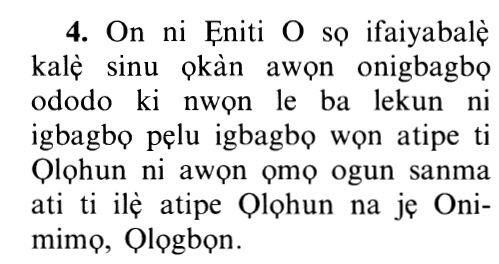48vs4
Select any filter and click on Go! to see results
هُوَ الَّذِي أَنزَلَ السَّكِينَةَ فِي قُلُوبِ الْمُؤْمِنِينَ لِيَزْدَادُوا إِيمَاناً مَّعَ إِيمَانِهِمْ وَلِلَّهِ جُنُودُ السَّمَاوَاتِ وَالْأَرْضِ وَكَانَ اللَّهُ عَلِيماً حَكِيماً
Huwa allathee anzala alssakeenata fee quloobi almumineena liyazdadoo eemanan maAAa eemanihim walillahi junoodu alssamawati waalardi wakana Allahu AAaleeman hakeeman
Index Terms
Click to play
Yoruba Translation

Hausa Translation
Shĩ ne wanda Ya saukar da natsuwa a cikin zukãtan mũminai dõmin su ƙãra wani ĩmãni tãre da imãninsu, alhãli kuwa rundunõnin sammai da ƙasa, na Allah kawai ne, kuma Allah Ya kasance Masani, Mai hikima.
Asbabu n-Nuzuul (Occasions of Revelation)
Allah sent down the Sakinah into the Hearts of the Believers
Allah the Exalted said,
هُوَ الَّذِي أَنزَلَ السَّكِينَةَ فِي قُلُوبِ الْمُؤْمِنِينَ لِيَزْدَادُوا إِيمَانًا مَّعَ إِيمَانِهِمْ ...
He it is Who sent down As-Sakinah into the hearts of the believers, that they may grow more in faith along with their faith.
meaning, tranquility.
Qatadah commented,
"Grace into the hearts of the believers'',
that is, the Companions, may Allah be pleased with them, on the Day of Al-Hudaybiyyah.
The companions were they, who accepted the call of Allah and His Messenger and obeyed the decisions of Allah and His Messenger. When their hearts felt content with acceptance and were at peace, Allah increased their faith, joining it to the faith they already had.
Al-Bukhari, and other Imams, relied on this Ayah as proof that faith increases and decreases in the hearts.
Allah the Exalted said next that had He willed, He would have inflicted defeat on the disbelievers, Allah says;
... وَلِلَّهِ جُنُودُ السَّمَاوَاتِ وَالْأَرْضِ ...
And to Allah belong the armies of the heavens and the earth,
and had He willed to send only one angel to them, that angel would have brought destruction to all what they had. However, Allah the Exalted willed Jihad and fighting to be established for, and by, the believers for great wisdom, clear reasons and unequivocal evidences that He had in all this.
This is why Allah the Great said next,
... وَكَانَ اللَّهُ عَلِيمًا حَكِيمًا ﴿٤﴾
and Allah is Ever All-Knower, All-Wise.
" هو الذي أنزل السكينة" أي جعل الطمأنينة قاله ابن عباس رضي الله عنهما , وعنه : الرحمة وقال قتادة الوقار في قلوب المؤمنين وهم الصحابة رضي الله عنهم يوم الحديبية الذين استجابوا لله ولرسوله وانقادوا لحكم الله ورسوله فلما اطمأنت قلوبهم بذلك واستقرت زادهم إيمانا مع إيمانهم وقد استدل بها البخاري وغيره من الأئمة على تفاضل الإيمان في القلوب ثم ذكر تعالى أنه لو شاء لانتصر من الكافرين فقال سبحانه وتعالى " ولله جنود السماوات والأرض" أي ولو أرسل عليهم ملكا واحدا لأباد خضراءهم ولكنه تعالى شرع لعباده المومنين الجهاد والقتال لما له في ذلك من الحكمة البالغة والحجة القاطعة والبراهين الدامغة ; ولهذا قال جلت عظمته " وكان الله عليما حكيما " .
"هو الذي أنزل السكينة" الطمأنينة "في قلوب المؤمنين ليزدادوا إيمانا مع إيمانهم" بشرائع الدين كلما نزل واحدة منها آمنوا بها ومنها الجهاد "ولله جنود السماوات والأرض" فلو أراد نصر دينه بغيركم لفعل "وكان الله عليما" بخلقه "حكيما" في صنعه أي لم يزل متصفا بذلك
" السكينة " : السكون والطمأنينة . قال ابن عباس : كل سكينة في القرآن هي الطمأنينة إلا التي في " البقرة " .
I'raab - grammatical analysis of the Qur'an
«هُوَ الَّذِي» مبتدأ وخبره والجملة مستأنفة.
«أَنْزَلَ السَّكِينَةَ» ماض ومفعوله والفاعل مستتر والجملة صلة.
«فِي قُلُوبِ» متعلقان بالفعل.
«الْمُؤْمِنِينَ» مضاف إليه.
«لِيَزْدادُوا» مضارع منصوب بأن مضمرة بعد لام التعليل وعلامة نصبه حذف النون والواو فاعل.
«إِيماناً» تمييز والمصدر المؤول من أن والفعل في محل جر بلام التعليل والجار والمجرور متعلقان بأنزل.
«مَعَ» ظرف مكان.
«إِيمانِهِمْ» مضاف إليه.
«وَلِلَّهِ» حرف استئناف وجار ومجرور خبر مقدم.
«جُنُودُ» مبتدأ مؤخر.
«السَّماواتِ» مضاف إليه.
«وَالْأَرْضِ» معطوف على السموات والجملة مستأنفة.
«وَكانَ» الواو حالية وماض ناقص.
«اللَّهُ» لفظ الجلالة اسمها.
«عَلِيماً حَكِيماً» خبران لكان والجملة حال.
